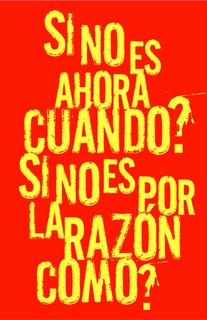
SIGN PETITION ON LINE AGAINST THE REPRESION IN GERMANY, FRANCE, Vancouver and BRAZIL
Ya está listo para firmar la carta de solidaridad con los compañeros de Alemania, Brasil, Canadá, Francia
http://www.petitiononline.com/rpresion/petition.html
----------------------------------------------------------
Mexico's left forms a coalition
By Kenneth Emmond/Look at The Herald Mexico
Please lok at the El Universal / Monday, Nov 6th, de 2006
What is FAP?
It´s the Broad Progressive Front (Frente Amplio Progresista), a coalition of Mexico´s three left-wing political parties, the Revolutionary Democratic Party (PRD), the Convergence Party and the Labor Party (PT).
Before the July elections, these parties campaigned together as the Coalition for the Good of All. Their presidential candidate was former Mexico City Mayor Andrés Manuel López Obrador. On Oct. 11, they formalized their status as the FAP coalition, with the goals of developing a common political agenda and presenting a united voting bloc in Congress.
It´s the first time a formal coalition has been created in Congress since enabling legislation was passed in 1977.
Antonio Gómez, a member of the Federal Electoral Institute (IFE), says it´s good for Mexican politics. He thinks of coalitions as "consensus-building instruments" that could help to break voting deadlocks that have stymied legislation in the past.
Horacio Duarte of the PRD concurs. "(It) allows the three parties in the Senate and the Chamber of Deputies to have consistent visions and common strategies and to present a common front, and this will allow us to work much more effectively," he said.
The three parties agree on a list of nine objectives. Most of them are motherhood-and-apple-pie items, but a couple stand out.
One is "transformation of the existing political regime." That might, or might not reflect López Obrador´s vow to change Mexico´s institutions, and might, or might not be good for Mexico, depending on what the changes are.
Another is to "recover the autonomy of the institutions, with respect to the special interests that have colonized the State, and return to a political system in accordance with the new plural reality of the nation." Few would look askance at that goal.
There may be another, less obvious objective alongside the laudable intent to consolidate viewpoints in Congress via the tri-party united front.
López Obrador´s refusal to accept defeat in the presidential election, and his refusal even now to recognize Felipe Calderón of the National Action Party (PAN) as president-elect, have distanced him from some powerful PRD members.
Governors of at least two PRD-dominated states and the party´s congressional coordinator, Javier González, have said they would defy his order not to acknowledge Calderon´s status, and are willing to work with him. Party founder Cuauhtemoc Cárdenas, still a powerful force within the PRD, endorses that strategy.
Instead, López Obrador arranged to have his followers anoint him Mexico´s "legitimate president," with the swearing-in to take place on Nov. 20, the anniversary of the Mexican Revolution. One editorial-writing wag commented that that will make him president of "Pejeland," a reference to his often-used nickname, el Peje.
López Obrador´s stance puts him in danger of being marginalized by his opponents within the party, especially after the PRD failed to win his home state, Tabasco, in the Oct. 15 election.
The concept of the FAP coalition was the idea of Manuel Camacho Solis, once a heavyweight for the Institutional Revolutionary Party (PRI) but most recently a PRD member of the Chamber of Deputies.
By endorsing the FAP, López Obrador may be able to turn the tables — to marginalize his in-party opponents by shifting the focus away from the PRD to the more broadly-based coalition.
If he succeeds, he may have another chance to run for president in 2012. Meanwhile, the coalition can prepare a legislative agenda to enhance its prospects for making electoral gains in the mid-term 2009 elections.
Whatever other effects the naming of López Obrador as "legitimate president" and the formation of the FAP may have, there´s at least one constructive element — the creation of a "shadow cabinet" to monitor the administration´s activities department by department and publicize its shortcomings.
Shadow cabinets are commonplace among opposition parties in countries like Britain and Canada, which operate under the British Parliamentary system. It makes sense there, since most cabinet ministers are members of Parliament, though they may also be recruited from the Upper House (the House of Lords in Britain and the Senate in Canada).
There, opposition party members have an opportunity to debate, question, harass, and even embarrass the government and its cabinet every day that Parliament sits. The daily Question Period, during which the opposition controls the agenda, makes it especially hard for a government to sweep unsavory issues under the carpet.
In a Republican system like Mexico has, a shadow cabinet does not have the same opportunity to interact directly with cabinet members. Instead, it must be creative, using news conferences and perhaps public demonstrations to highlight what it believes to be errors and mismanagement being committed within the administration.
It can still be effective at keeping incompetent or corrupt members of government in the public spotlight.
Questions remain about the FAP coalition. How effective will it be? Can it avoid the divisiveness that afflicts most coalitions and groups that lose elections? How will the more conservative wing of the PRD respond to it? Will López Obrador emerge as the party´s dominant force, or will power revert to the Cárdenas faction?
The FAP is an experiment with real potential in Mexican politics, and one that bears watching.
Video from Germany, look it!
http://apoyaamlo.blogspot.com/2006/11/video-manifestacin-1-de-noviembre-en.html



No comments:
Post a Comment